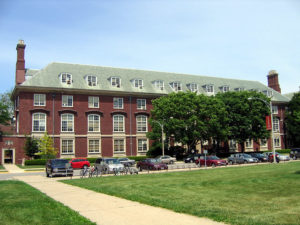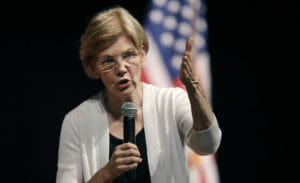Freedom of Speech a Casualty of Official Response to Student Drinking
(Updated) Professors at my hometown university are silent as city and college officials seek blood after a beer-fueled clash between students and police.
Update: Upon seeking an interview with President Shepard through Western Washington University’s Office of Communications, Communications Director Paul Cocke told me that after talking to “[The] Western Front, AS Review, Bellingham Herald, KING 5 TV and Association [sic] Press,” President Shepard would not answer questions from Truthdig.
BELLINGHAM — I went to my old university campus this week to seek insight on something that happened last weekend. The police breakup of a large party in Bellingham, Wash., the night of Oct. 12 led to an erratic skirmish in the streets between authorities and as many as 500 college-age partiers and onlookers, some of whom damaged city and private property by throwing glassware, pieces of cinder blocks and other objects. The police responded by trading their uniforms and squad cars for riot gear and an armored truck and set to dispersing the crowd with smoke, exploding pepper balls and densely packed beanbags fired from rifles. The event made international news. A photo of a girl “twerking” against a cop car appeared under the title “Bellingham party riot fights police efforts to shut down fun” on the website of the London Daily Mail.
What the police, local paper and many people around town have agreed was a riot, but which is probably better described as a large drinking party that grew unruly after police intervention, drew swift and fierce condemnation from the community. On Facebook and in conversations in bars and restaurants, locals and students have for six days called for a show of no mercy for everyone involved. In an official statement posted to the university website the morning after the event, Western Washington University President Bruce Shepard and the student body leader vowed to expel any students identified in the crowd by detectives reviewing photos posted on social media and taken by police. The student body Board of Directors approved a resolution condemning the event, and nearly 3,000 people signed a petition saying they “deplore the violence” and are “proud of WWU’s true values.” The landlord of the place where the trouble began has promised to evict the tenants who threw the first party and send incriminating photos to their parents. The students involved whom I spoke to are terrified. It seems clear that if the community and the officials have their way, the consequences for those identified will be terrible.
Over the course of two days I spoke with six sociology professors in their campus offices. I explained to each that I was a former WWU student and a working journalist researching the event for a story that would express concern for the students and the severe punishments the authorities seem prepared, even anxious, to exact against them. “The university administration, local editors and reporters, and other sources of information don’t seem to be trying to understand why Saturday night happened,” I told the first professor. “I’m looking for an expert who can place the students’ behavior and the police response in their proper social context and help everyone involved have an informed discussion, rather than the emotional one that’s currently prevailing.” The professor’s chair squeaked as a moment passed. “I’m reluctant to discuss it because I wasn’t there,” the professor said. “I only know what the papers reported, so I think it would be irresponsible of me to comment on something that directly involves our students.”
The answer neither surprised nor satisfied me. I am aware of the tense, sometimes fear filled atmosphere that exists among faculty in most American universities, a consequence of changes in recent decades in administrative structure and short budgeting. Hoping to encourage the professor to say more, I said, “The community is coming down hard on these kids. The president has promised to throw them out. The chief of police is working to arrest them. Their futures are in genuine danger and no one with any power is in their corner. It seems to me they need their teachers now more than ever, especially those with expertise relevant to the fix they’re in.”
More silence followed. The professor seemed to understand but was not going to talk. I grasped the predicament. A public attempt to explain the event could invite accusations of condonation and be seen as an implicit challenge to the administration. Jobs and wellbeing are at stake. In a sense, the professor wasn’t in much better shape than the students. After wavering for a few moments, my email address was politely requested and I was told I might hear from someone.
I spent the next hour knocking on office doors. The criminology professors weren’t in, but I figured any scholar who is devoting his or her life to the deep study of group behavior would be able to shed some light on the situation. Of the half dozen faculty members I approached, none talked. One by one, with their framed Ph.D.s sometimes visible in the background, they calmly explained that they were not qualified to comment. Two agreed to vague plans to talk in the future. One abruptly declined to speak because, as was explained, “I overheard you talking with another professor.” The rest referred me elsewhere. Just one of them directed me to newspaper clippings of an unrelated event before expressing measured doubt about whether the school should be involved in disciplining students for events off campus. But the thought went no further. The administration already disliked this professor, I learned.
I left empty-handed. In the spirit of what I was told during college was one of the true purposes of academia, I’d hoped to make use of the scholars’ expertise for the good of the community. But the professors I went to wouldn’t profess. Meanwhile, the official campaign to bring those involved to some kind of justice is gathering strength. Thursday evening there was a new headline on the front page of the local paper: “Bellingham police seek help identifying people at riot.” An accompanying gallery invited readers to review grainy photos taken during the event of 11 unwitting youths standing in the frenzied darkness.
Your support matters…Independent journalism is under threat and overshadowed by heavily funded mainstream media.
You can help level the playing field. Become a member.
Your tax-deductible contribution keeps us digging beneath the headlines to give you thought-provoking, investigative reporting and analysis that unearths what's really happening- without compromise.
Give today to support our courageous, independent journalists.







You need to be a supporter to comment.
There are currently no responses to this article.
Be the first to respond.